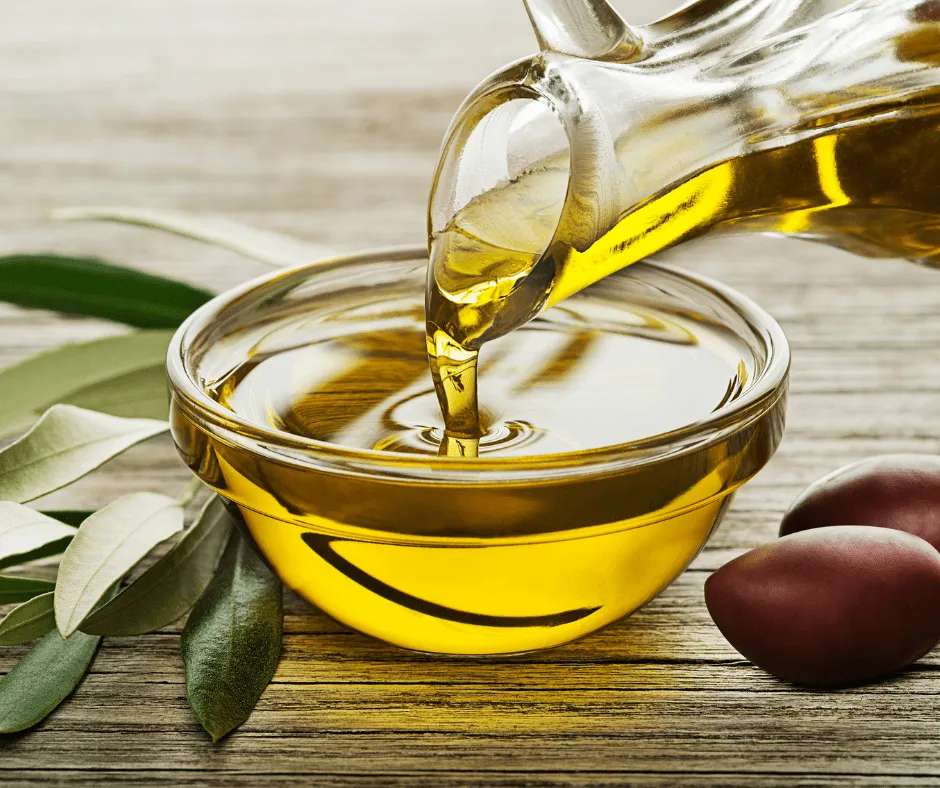Olive oils are loaded with antioxidants and powerful anti-inflammatory properties – probably one of the healthiest foods you can eat! It’s use dates back almost 6000 years.
Olive oil is rich in monounsaturated fats. Replacing foods high in saturated fat with the monounsaturated fats can help lower risk of heart disease by way of lowering cholesterol, as well as improve blood sugar control.
When picking an olive oil, make sure it’s extra virgin. The key to virgin oil is that it’s an olive oil that’s extracted from the olive by mechanical means only, with no chemicals or heat added. Extra-virgin usually signifies that the oil was cold pressed from the first pressing of olives, which results in the purest, least acidic oil as well as the best-tasting oil.
The three enemies of olive oil are light, heat, and air. You want to look for a dark bottle if it’s extra virgin because the dark bottle protects it from light. Though it may be tempting to keep it next to your stove for easy access, the heat can turn the oils rancid quickly. That’s why the pantry is an ideal spot for storage.
Like everything else on the shelves, olive oil comes with a “best by” date, and the fresher the olive oil, the better. If a bottle does not have a best by date on it, I wouldn’t recommend buying it. Also, if it has a ‘pressed on’ or ‘harvest date’, it’s likely to be a higher quality oil, and if you see the name of the producer or estate, or the variety of olive used, it’s likely legit. The more specifics, the better!
If the bottle says “light tasting,” or just plain old “olive oil,” without the words virgin or extra-virgin, chances are it’s refined or processed.
And if you taste a peppery flavor, bitterness, or even pungency, that’s a good thing since it’s one indicator that the oil is rich in phenols and polyphenols, which are amazing for our health.
Also, make sure to use it within 8 to 10 weeks of opening. An unopened bottle can last for two years if stored in a cool, dark place.
Are there any downsides to using olive oil? Not really, but just a couple of things to watch for. One problem you may run into with olive oil is weight gain if you were to eat too much. Because olive oil comes with so many health benefits, it can be easy to assume that the more you eat, the better you’ll feel. But be sure to remember that it is an oil with about 120 calories per tablespoon, so overeating it can lead to weight gain. And, because it’s so calorie-dense for such a small amount, it can also be easy to overuse.
Another concern is cooking with olive oil. Extra virgin olive oil has a smoke point of 350 to 410 degrees F. Higher temperatures will break down the free fatty acid content of the oil, producing free radicals, which are not good for us. But the good news is that stove-top cooking hovers about 350 degrees F. For higher temps (like higher-heat oven roasting), consider avocado oil, since it has a higher smoke point.
As you can likely tell, I enjoy cooking and share great recipes and weight loss cooking tips every day with my patients. Simple, healthy cooking with flavorful taste is easier than you may think!
Feel free to reach out to me and my team at Physicians Weight and Wellness Center in Northern Virginia if you have any questions or if you are ready to get started on your successful weight loss journey. We would be honored to guide you every step of the way.






 in CA by O360®
in CA by O360®